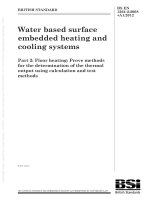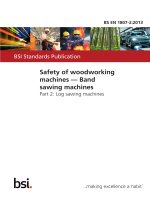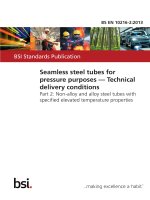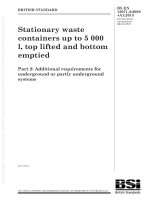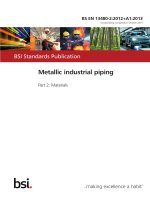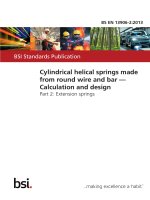Bsi bs en 61747 2 1 2013
Bạn đang xem bản rút gọn của tài liệu. Xem và tải ngay bản đầy đủ của tài liệu tại đây (1.1 MB, 18 trang )
BS EN 61747-2-1:2013
BSI Standards Publication
Liquid crystal display devices
Part 2-1: Passive matrix monochrome LCD
modules — Blank detail specification
BRITISH STANDARD
BS EN 61747-2-1:2013
National foreword
This British Standard is the UK implementation of EN 61747-2-1:2013. It is
identical to IEC 61747-2-1:2013. It supersedes BS EN 61747-2-1:2001 which
is withdrawn.
The UK participation in its preparation was entrusted to Technical Committee
EPL/47, Semiconductors.
A list of organizations represented on this committee can be obtained on
request to its secretary.
This publication does not purport to include all the necessary provisions of a
contract. Users are responsible for its correct application.
© The British Standards Institution 2013.
Published by BSI Standards Limited 2013
ISBN 978 0 580 75542 2
ICS 31.120
Compliance with a British Standard cannot confer immunity from
legal obligations.
This British Standard was published under the authority of the Standards
Policy and Strategy Committee on 31 July 2013.
Amendments/corrigenda issued since publication
Date
Text affected
BS EN 61747-2-1:2013
EN 61747-2-1
EUROPEAN STANDARD
NORME EUROPÉENNE
EUROPÄISCHE NORM
June 2013
ICS 31.120
Supersedes EN 61747-2-1:2001
English version
Liquid crystal display devices Part 2-1: Passive matrix monochrome LCD modules Blank detail specification
(IEC 61747-2-1:2013)
Dispositifs d’affichage à cristaux liquides Partie 2-1: Modules d'affichage à cristaux
liquides (LCD) monochromes à matrice
passive Spécification particulière cadre
(CEI 61747-2-1:2013)
Flüssigkristall-Anzeige-Bauelemente Teil 2-1: Einfarbige passive MatrixFlüssigkristall-Anzeigemodule (LCDModule) – Vordruck für
Bauartspezifikation
(IEC 61747-2-1:2013)
This European Standard was approved by CENELEC on 2013-04-22. CENELEC members are bound to comply
with the CEN/CENELEC Internal Regulations which stipulate the conditions for giving this European Standard
the status of a national standard without any alteration.
Up-to-date lists and bibliographical references concerning such national standards may be obtained on
application to the CEN-CENELEC Management Centre or to any CENELEC member.
This European Standard exists in three official versions (English, French, German). A version in any other
language made by translation under the responsibility of a CENELEC member into its own language and notified
to the CEN-CENELEC Management Centre has the same status as the official versions.
CENELEC members are the national electrotechnical committees of Austria, Belgium, Bulgaria, Croatia, Cyprus,
the Czech Republic, Denmark, Estonia, Finland, Former Yugoslav Republic of Macedonia, France, Germany,
Greece, Hungary, Iceland, Ireland, Italy, Latvia, Lithuania, Luxembourg, Malta, the Netherlands, Norway, Poland,
Portugal, Romania, Slovakia, Slovenia, Spain, Sweden, Switzerland, Turkey and the United Kingdom.
CENELEC
European Committee for Electrotechnical Standardization
Comité Européen de Normalisation Electrotechnique
Europäisches Komitee für Elektrotechnische Normung
Management Centre: Avenue Marnix 17, B - 1000 Brussels
© 2013 CENELEC -
All rights of exploitation in any form and by any means reserved worldwide for CENELEC members.
Ref. No. EN 61747-2-1:2013 E
BS EN 61747-2-1:2013
EN 61747-2-1:2013
-2-
Foreword
The text of document 110/371/CDV, future edition 2 of IEC 61747-2-1, prepared by IEC TC 110
"Electronic display devices" was submitted to the IEC-CENELEC parallel vote and approved by
CENELEC as EN 61747-2-1:2013.
The following dates are fixed:
•
•
latest date by which the document has
to be implemented at national level by
publication of an identical national
standard or by endorsement
latest date by which the national
standards conflicting with the
document have to be withdrawn
(dop)
2014-01-22
(dow)
2016-04-22
This document supersedes EN 61747-2-1:2001.
EN 61747-2-1:2013 includes the following significant technical changes with respect to EN 61747-21:2001:
– several words and test conditions were added in Clause 7 and Clause 8;
– the new edition was editorially changed according to the current CEN-CENELEC Internal Regulations –
Part 3.
Attention is drawn to the possibility that some of the elements of this document may be the subject of
patent rights. CENELEC [and/or CEN] shall not be held responsible for identifying any or all such patent
rights.
Endorsement notice
The text of the International Standard IEC 61747-2-1:2013 was approved by CENELEC as a European
Standard without any modification.
-3-
BS EN 61747-2-1:2013
EN 61747-2-1:2013
Annex ZA
(normative)
Normative references to international publications
with their corresponding European publications
The following documents, in whole or in part, are normatively referenced in this document and are
indispensable for its application. For dated references, only the edition cited applies. For undated
references, the latest edition of the referenced document (including any amendments) applies.
NOTE When an international publication has been modified by common modifications, indicated by (mod), the relevant EN/HD
applies.
Publication
Year
Title
EN/HD
Year
IEC 61747-1
+ A1
1998
2003
Liquid crystal and solid-state display devices - EN 61747-1
Part 1: Generic specification
+ A1
1999
2003
IEC 61747-2
1998
Liquid crystal and solid-state display devices - EN 61747-2
Part 2: Liquid crystal display modules Sectional specification
1999
IEC 61747-5
1998
Liquid crystal and solid-state display devices - EN 61747-5
Part 5: Environmental, endurance and
mechanical test methods
1998
–2–
BS EN 61747-2-1:2013
61747-2-1 © IEC:2013
CONTENTS
1
General ............................................................................................................................ 5
2
1.1 Scope ...................................................................................................................... 5
1.2 Normative references .............................................................................................. 5
Guidance for preparation of a detail specification ............................................................. 5
3
Marking ............................................................................................................................ 7
4
Ordering information ......................................................................................................... 7
5
Limiting values (absolute maximum rating system) ........................................................... 7
6
Operating range and electrical and optical characteristics ................................................ 9
7
6.1 Recommended operating range ............................................................................... 9
6.2 Electrical and optical characteristics ...................................................................... 10
Test conditions and inspection requirements .................................................................. 11
8
Qualification approval test (group D) .............................................................................. 13
9
Additional information ..................................................................................................... 13
Annex A (informative) Additional information items .............................................................. 14
Figure 1 – Block diagram examples for explanation of supply voltages ................................... 9
Table 1 – Limiting values ........................................................................................................ 8
Table 2 – Recommended operating range ............................................................................. 10
Table 3 – Electrical and optical characteristics ...................................................................... 11
Table 4 – Group A – Lot-by-lot inspection ............................................................................. 12
Table 5 – Group B – Lot-by-lot inspection ............................................................................. 12
Table 6 – Group C – Periodic tests ....................................................................................... 12
BS EN 61747-2-1:2013
61747-2-1 © IEC:2013
–5–
LIQUID CRYSTAL DISPLAY DEVICES –
Part 2-1: Passive matrix monochrome LCD modules –
Blank detail specification
1
1.1
General
Scope
This part of IEC 61747 serves as a Blank Detail Specification (BDS) for a high quality
approval system and contains requirements for style and layout and minimum content of detail
specifications. These requirements are applicable when the detail specification is published
(e.g. for standard product).
1.2
Normative references
The following documents, in whole or in part, are normatively referenced in this document and
are indispensable for its application. For dated references, only the edition cited applies. For
undated references, the latest edition of the referenced document (including any
amendments) applies.
IEC 61747-1:2003, Liquid crystal and solid-state display devices – Part 1: Generic
specification
IEC 61747-2:1998, Liquid crystal and solid-state display devices – Part 2: Liquid crystal
display modules – Sectional specification
IEC 61747-5:1998, Liquid crystal and solid-state display devices – Part 5: Environmental,
endurance and mechanical test methods
2
Guidance for preparation of a detail specification
The front page layout is illustrated. When the detail specifications for customer circuits are not
published, the layout requirements of the blank detail specification are optional. A suggested
front page layout is also illustrated. An example of a Customer Detail Specification (CDS) is
also given.
The numbers between square brackets on the front page of the blank detail specification
illustrated correspond to the following indications which should be given:
[1] The name of the National Standards Organization under whose authority the detail
specification is issued.
[2] The IECQ number of the detail specification.
[3] The numbers and issue numbers of the generic and sectional specifications.
[4] The national number of the detail specification, date of issue and any further information,
if required by the national system.
[5] Type number(s) of component.
[6] Information on typical construction and applications. If a device is designed to satisfy
several applications, this shall be stated here. Characteristics, limits and inspection
BS EN 61747-2-1:2013
61747-2-1 © IEC:2013
–6–
requirements for these applications shall be met. If a device is electrostatic sensitive, or
contains hazardous materials, a caution statement shall be added in the detail
specification.
[7] Outline drawing and/or reference to the relevant document for outlines.
[8] Category of assessment quality.
[9] Reference data on the most important properties to permit comparison between types.
Layout of Blank Detail Specification (BDS):
[Name (address) of responsible NAI (and
[1] [Number of IECQ detail specification
possibly of body from which specification is available).]
ELECTRONIC COMPONENTS OF
[2]
plus issue number and/or date.]
[3] [National number of detail specification]
[4]
ASSESSED QUALITY IN ACCORDANCE WITH:
Generic specification:
IEC 61747-1/QC 720000
[and national references if different.]
[This box need not be used if national number repeats
IECQ number.]
BLANK DETAIL SPECIFICATION FOR: PASSIVE MATRIX MONOCHROME LCD MODULES
[5]
[Type number(s) of the relevant device(s) and if appropriate structurally similar devices.]
Ordering information: see Clause 5 of this specification.
Mechanical description
Outline references:
Short description
[7] Type of electro-optical effect
[Mandatory if available, IEC and/or national number]
Structure:
e.g.
–
–
LCD with electronic circuits (IC) mounted
on cell substrate or separate PWB
e.g.
–
overall dimensions
–
viewing area
–
effective display area
e.g.
–
reflective, transflective, transmissive
–
grey scale: number
–
light image on a dark background, dark image
on a light background
Preferred viewing direction:
Electrical specification:
e.g.
Display format:
–
interface (supply, data)
–
backlight (e.g. fluorescent lamp CCFL (cold
cathode fluorescent lamp)/HCFL (hot cathode
fluorescent lamp), LED, EL)
–
number of rows and columns
–
pixel size
Application(s):
–
pixel pitch
e.g.
Connection type:
e.g.
–
pin identification
–
connector identification
[6]
Twisted Nematic (TN), Supertwisted Nematic
(STN), etc.
Optical mode of operation:
integrated backlight
Outline drawing and dimensions:
–
–
personal computer, automobile
Categories of assessed quality
[8]
–
type number of connector used
[See 4.5 of the generic specification IEC 61747-1:2003.]
–
type number of mating connector
Reference data
Marking:
[The detail specification shall prescribe the information
to be marked on the device.]
[See Clause 4, and 4.4 of the generic specification.]
Mass:
Information about manufacturers who have components qualified to this detail specification is available in the
current qualified products list.
[9]
BS EN 61747-2-1:2013
61747-2-1 © IEC:2013
3
–7–
Marking
Refer to A.1.
4
Ordering information
The following minimum information is necessary to order a specified device, unless otherwise
specified:
–
precise type reference;
–
IECQ reference of detail specification with issue number and/or date when relevant;
–
category of assessed quality as defined in 4.5 of the generic specification
IEC 61747-1:2003 and, if required, screening sequence as defined in 4.8 of the sectional
specification IEC 61747-2:1998;
–
any other particulars.
5
Limiting values (absolute maximum rating system)
The values in Table 1 apply over the operating temperature range unless otherwise specified.
Figure 1 shows the block diagram examples for explanation of supply voltages which are
denoted in Table 1. GND shows the ground voltage level.
The “X” denotes that a value shall be inserted in the detail specification. Repeat only
subclause numbers used with title. Any additional values shall be given at the appropriate
place, but without subclause number(s).
BS EN 61747-2-1:2013
61747-2-1 © IEC:2013
–8–
Table 1 – Limiting values
Subclause
Parameters
Symbol
Value
Unit
Minimum
Maximum
5.1
Operating ambient temperature
T op
X
X
°C
5.2
Storage temperature
T stg
X
X
°C
5.3
Supply voltage(s)
5.3.1
Supply voltage for logic drive
V DD – V SS
X
X
V
5.3.2
Supply voltage for LCD drive
V DD – V EE
or
V EE – V SS
or
V O – V SS
or
V DD – V O
X
X
V
Input signal voltage
V IN
X
X
V
5.5.1
Backlight voltage (where appropriate)
V BL
X
V
5.5.2
Backlight current (where appropriate)
I BL
X
mA
Soldering temperature (where appropriate)
T sld
X
°C
5.4
5.5
5.6
Block diagram
The internal module circuitry is not required to be disclosed in either the BDS or the CDS.
BS EN 61747-2-1:2013
61747-2-1 © IEC:2013
–9–
VDD (+)
LCD
module
VSS (GND)
VEE (+)
LCD
module
VDD (+)
VEE (−)
VSS (GND)
Supply voltage for LCD drive: VDD − VEE
Supply voltage for LCD drive: VEE − VSS
Supply voltage for logic drive: VDD − VSS
Supply voltage for logic drive: VDD − VSS
VDD (+)
VDD (+)
LCD
module
LCD
module
VO
VSS (GND)
VSS (GND)
VO
(−)
Supply voltage for LCD drive: VO − VSS
Supply voltage for LCD drive: VDD − VO
Supply voltage for logic drive: VDD − VSS
Supply voltage for logic drive: VDD − VSS
IEC 594/13
Figure 1 – Block diagram examples for explanation of supply voltages
6
6.1
Operating range and electrical and optical characteristics
Recommended operating range
The “X” denotes that a value in Table 2 shall be inserted in the detail specification.
BS EN 61747-2-1:2013
61747-2-1 © IEC:2013
– 10 –
Table 2 – Recommended operating range
Subclause
Characteristics at T op = 25 °C
Symbol
unless otherwise specified
6.1.1
Value
Unit
Minim
um
Maxim
um
Operating voltage range of supply voltage(s)
6.1.1.1
Supply voltage for logic drive
V DD – V SS
X
X
V
6.1.1.2
Supply voltage for LCD drive
V DD – V EE
X
X
V
or
V EE – V SS
or
V O – V SS
or
V DD – V O
Operating voltage range of input signal voltages
V IN
6.1.2.1
Input signal voltage, high
V IH
X
X
V
6.1.2.2
Input signal voltage, low
V IL
X
X
V
6.1.3
Operating voltage range of backlight voltages
(where appropriate)
V BL
X
X
V
6.1.4
Operating frequency range(s)
(where appropriate)
f op
6.1.2
6.1.4.1
Operating frame frequency range
f FRM
X
X
Hz
Oscillator frequency range
F osc
X
X
Hz
and/or
6.1.4.2
6.2
Electrical and optical characteristics
See Clause 8 for inspection requirements.
The “X” denotes that a value in Table 3 shall be inserted in the detail specification. Repeat
only the subclause numbers used with the title. Any additional characteristics shall be given at
the appropriate place but without the subclause number(s).
When several devices are defined in the same detail specification, the relevant values shall
be given on successive lines, avoiding repeating identical values.
BS EN 61747-2-1:2013
61747-2-1 © IEC:2013
– 11 –
Table 3 – Electrical and optical characteristics
Subclause
Characteristics and conditions at T op
Symbol
Unit
= 25 °C unless otherwise specified
6.2.1
6.2.2
6.2.3.1
Supply current (without BLU) at specified
frame frequency, specified operating supply
voltage, with an adequate display pattern and
other electrical driving conditions chosen in
order to achieve maximum supply current
Mini
mum
I tot
Tested
Maxi
mum
In subgroup
mA
X
A3
mA
X
A3
or
I DD
and/or
I EE
I BL
Operating backlight current at specified
operating backlight voltage (where
appropriate)
Contrast ratio (direct beam and/or diffused
light) with specified light source at specified
viewing angle
Value
CR dir
X
A2
X
C2b
A2
and/or
CR diff
6.2.3.2
Contrast ratio (direct beam and/or diffused
light)
T op =maximum and minimum or specified
temperature, light source and specified
viewing direction
CR dir
and/or
CR diff
6.2.4
Luminance
Specified measuring method and conditions
L
cd/m2
X
6.2.5
Viewing angle range at specified definition of
viewing direction and contrast ratio
θH
deg
X
X
θV
deg
X
X
C2a
and
6.2.6
Turn-on time at specified temperature
t on
ms
X
C2a
6.2.7
Turn-off time at specified temperature
t off
ms
X
C2a
6.2.8
Transmittance (regular and/or diffuse) at
specified measuring method and conditions
(where appropriate)
τr
and/or
%
X
%
X
C2a
τd
6.2.9
Reflectance (regular and/or diffuse) at
specified measuring method and conditions
(where appropriate)
ρr
and/or
X
C2a
ρd
7
Test conditions and inspection requirements
These are given in the following Table 4, Table 5 and Table 6, where the values and exact
test conditions to be used should be specified as required for a given type, and as required
by the relevant test in the relevant publications.
When several devices are included in the same detail specification, the relevant conditions
and/or values should be given in sequence, avoiding where possible repetition of identical
conditions and/or values.
Tests shall be made at 25 °C, unless otherwise specified.
Tests marked (D) are destructive.
– 12 –
BS EN 61747-2-1:2013
61747-2-1 © IEC:2013
Table 4 – Group A – Lot-by-lot inspection
Subgroup
Conditions at T op = 25 °C
unless otherwise specified
(see Clause 4 of
the generic specification
IEC 61747-1:2003)
Tests
Limits
Minimum
Maximum
A1
External visual examination
(no electrical connection)
See 4.2.1 of the
generic specification
IEC 61747-1:2003
A2
Visual defects
See IEC 61747-5
A3
Contrast ratio
See 6.2.3.1
X
Operating display luminance
(where appropriate)
See 6.2.4
X
Supply current
See 6.2.1
X
Operating backlight current
(where appropriate)
See 6.2.2
X
Table 5 – Group B – Lot-by-lot inspection
(In the case of Category I, see 4.5 of the generic specification IEC 61747-1:2003.)
Subgroup
Conditions at T op = 25 °C
unless otherwise specified
(see Clause 4 of
the generic specification
IEC 61747-1:2003)
Tests
B1
Limits
Minimum
Dimensions
Maximum
See Clause 1
Table 6 – Group C – Periodic tests
Subgroup
Tests
Conditions at T op = 25 °C
unless otherwise specified (see
clause 4 of the generic
specification IEC 61747-1:2003)
Limits
Minim
um
Maxim
um
C1
Dimensions
See Clause 1
C2a
Viewing angle range
See 6.2.5
Turn-on time
See 6.2.6
X
Turn-off time
See 6.2.7
X
Transmittance (where appropriate)
See 6.2.8
X
Reflectance (where appropriate)
See 6.2.9
X
X
C2b
Contrast ratio
See 6.2.3.2
C4
Bond strength for external pins (D)
See 2.6 of IEC 61747-5:1998
C5
Change of temperature (D)
See 3.1 of IEC 61747-5:1998
C6
Shock (D)
See 2.4 of IEC 61747-5:1998
Vibration (D)
See 2.3 of IEC 61747-5:1998
C7
Damp heat cyclic (12+12-hour cycle) (D)
See 3.6 of IEC 61747-5:1998
C8
Electrical endurance (D)
To be specified in the detail
specification
C9
Storage (at high temperature)
See 3.2 of IEC 61747-5:1998
Storage (at low temperature)
See 3.3 of IEC 61747-5:1998
C10
Low air pressure (D)
See 3.4 of IEC 61747-5:1998
C11
Permanence of marking (D)
(where appropriate)
See 4.1 of IEC 61747-5:1998
C12
ESD (D)
To be specified in the detail
specification
CRRL
Attributes information for C5, C6, C7, C8, C9 and C11
X
X
X
BS EN 61747-2-1:2013
61747-2-1 © IEC:2013
8
– 13 –
Qualification approval test (group D)
When required, these tests shall be prescribed in the sectional specification for qualification
approval only.
9
Additional information
Refer to A.2.
– 14 –
BS EN 61747-2-1:2013
61747-2-1 © IEC:2013
Annex A
(informative)
Additional information items
A.1 Any particular information other than that given in Clause 1 on the front page and/or in
4.4 of the generic specification IEC 61747-1:2003 shall be given here.
A.2
The following items should be reported in case there is any requirement from customers:
–
pixel chart of display area;
–
data input timing;
–
interface timing chart;
–
interface timing ratings;
–
circuit block diagram;
–
measuring points of luminance;
–
precautions with respect to electrostatic discharge;
–
precautions for installation: mechanical and/or electrical;
–
supply voltages sequence condition;
–
handling information;
–
hazard/safety information;
–
characterization of diffuse and specular reflectance and transmittance.
_____________
This page deliberately left blank
NO COPYING WITHOUT BSI PERMISSION EXCEPT AS PERMITTED BY COPYRIGHT LAW
British Standards Institution (BSI)
BSI is the national body responsible for preparing British Standards and other
standards-related publications, information and services.
BSI is incorporated by Royal Charter. British Standards and other standardization
products are published by BSI Standards Limited.
About us
Revisions
We bring together business, industry, government, consumers, innovators
and others to shape their combined experience and expertise into standards
-based solutions.
Our British Standards and other publications are updated by amendment or revision.
The knowledge embodied in our standards has been carefully assembled in
a dependable format and refined through our open consultation process.
Organizations of all sizes and across all sectors choose standards to help
them achieve their goals.
Information on standards
We can provide you with the knowledge that your organization needs
to succeed. Find out more about British Standards by visiting our website at
bsigroup.com/standards or contacting our Customer Services team or
Knowledge Centre.
Buying standards
You can buy and download PDF versions of BSI publications, including British
and adopted European and international standards, through our website at
bsigroup.com/shop, where hard copies can also be purchased.
If you need international and foreign standards from other Standards Development
Organizations, hard copies can be ordered from our Customer Services team.
Subscriptions
Our range of subscription services are designed to make using standards
easier for you. For further information on our subscription products go to
bsigroup.com/subscriptions.
With British Standards Online (BSOL) you’ll have instant access to over 55,000
British and adopted European and international standards from your desktop.
It’s available 24/7 and is refreshed daily so you’ll always be up to date.
You can keep in touch with standards developments and receive substantial
discounts on the purchase price of standards, both in single copy and subscription
format, by becoming a BSI Subscribing Member.
PLUS is an updating service exclusive to BSI Subscribing Members. You will
automatically receive the latest hard copy of your standards when they’re
revised or replaced.
To find out more about becoming a BSI Subscribing Member and the benefits
of membership, please visit bsigroup.com/shop.
With a Multi-User Network Licence (MUNL) you are able to host standards
publications on your intranet. Licences can cover as few or as many users as you
wish. With updates supplied as soon as they’re available, you can be sure your
documentation is current. For further information, email
BSI Group Headquarters
389 Chiswick High Road London W4 4AL UK
We continually improve the quality of our products and services to benefit your
business. If you find an inaccuracy or ambiguity within a British Standard or other
BSI publication please inform the Knowledge Centre.
Copyright
All the data, software and documentation set out in all British Standards and
other BSI publications are the property of and copyrighted by BSI, or some person
or entity that owns copyright in the information used (such as the international
standardization bodies) and has formally licensed such information to BSI for
commercial publication and use. Except as permitted under the Copyright, Designs
and Patents Act 1988 no extract may be reproduced, stored in a retrieval system
or transmitted in any form or by any means – electronic, photocopying, recording
or otherwise – without prior written permission from BSI. Details and advice can
be obtained from the Copyright & Licensing Department.
Useful Contacts:
Customer Services
Tel: +44 845 086 9001
Email (orders):
Email (enquiries):
Subscriptions
Tel: +44 845 086 9001
Email:
Knowledge Centre
Tel: +44 20 8996 7004
Email:
Copyright & Licensing
Tel: +44 20 8996 7070
Email:

